Entering Canada as a temporary foreign worker requires careful planning and specific documentation. The Labour Market Impact Assessment (LMIA) is a key element in this process, ensuring that employers prioritize qualified Canadian workers while addressing genuine labour shortages.
This two-stage journey begins with obtaining a positive LMIA from Employment and Social Development Canada (ESDC). This assessment confirms that hiring a foreign worker for the specific position and location will not negatively impact the Canadian labour market. Employers must demonstrate that they have made genuine efforts to recruit qualified Canadian citizens or permanent residents before seeking an LMIA.
With a positive LMIA in hand, the foreign worker can then apply for a work permit through Immigration, Refugees and Citizenship Canada (IRCC). This involves meeting specific eligibility requirements and submitting necessary documentation.
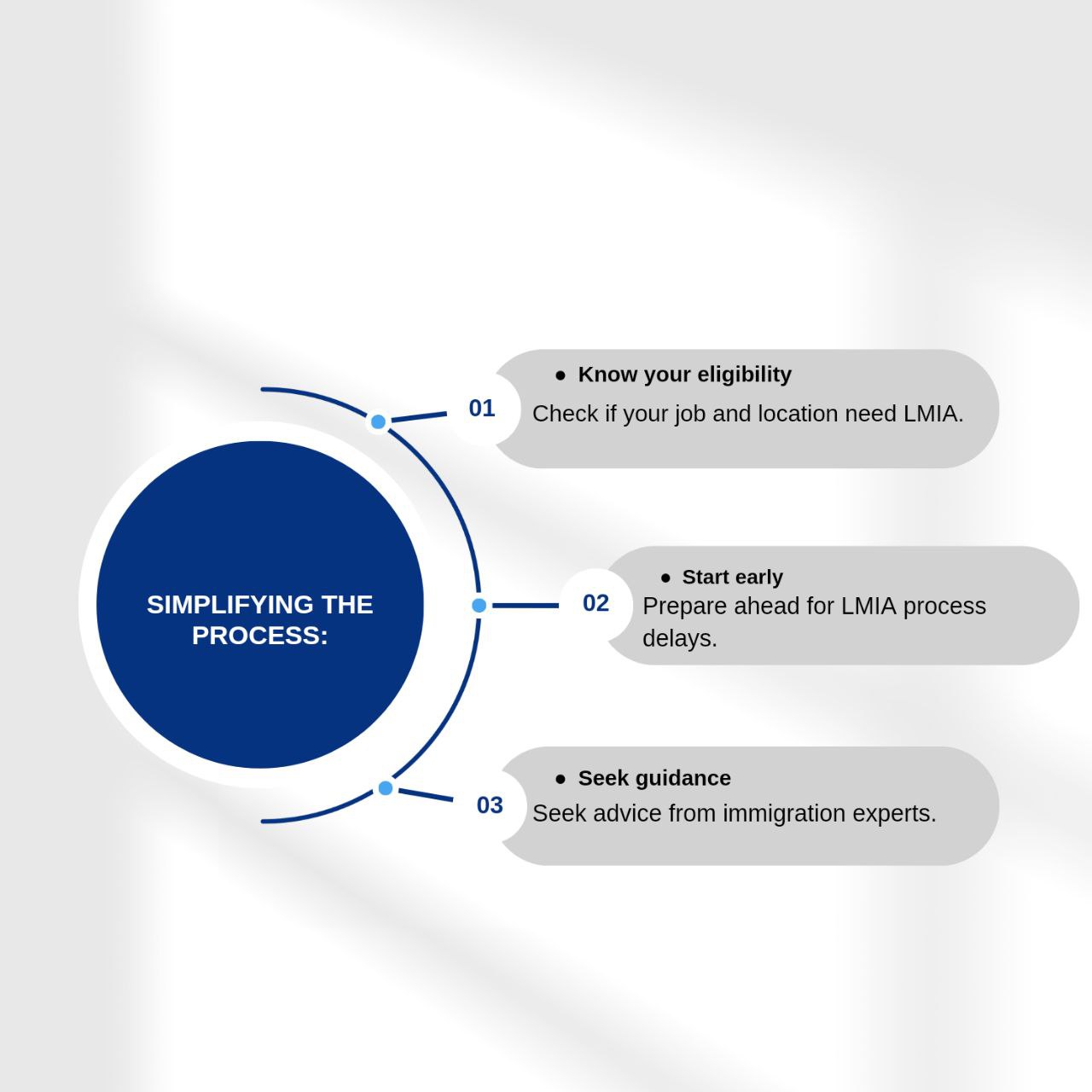
Simplifying the process:
- Know your eligibility: Determine if your occupation and work location fall under an LMIA requirement.
- Start early: The LMIA application process can take several weeks, so plan ahead.
- Seek guidance: Consult with an immigration professional for expert assistance.
By navigating the LMIA process effectively, employers can access skilled foreign talent while ensuring compliance with Canadian regulations and contributing to a robust and diverse labour market.
What is an LMIA?

An LMIA is a review process conducted by the Canadian government to assess the potential impact of hiring a foreign worker on the domestic labor market. This helps ensure that employers are not displacing Canadian citizens or permanent residents for available positions.
Do I need an LMIA?
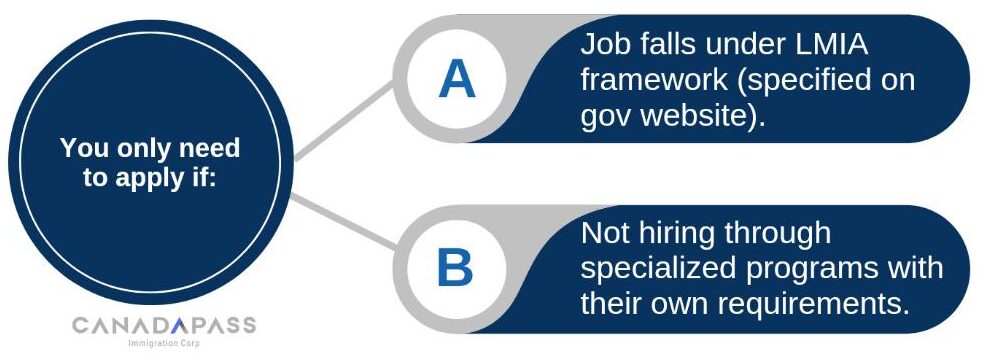
Not all employers need an LMIA. You only need to apply if:
- The job you’re offering falls within the LMIA framework (specific occupations and sectors are listed on the government website)
- You’re not hiring through a specific program like Global Talent Stream, Intra-Company Transfer, or TechImmigration (which have their own requirements)
Here’s the revised “LMIA Application Process: Step by Step” section:
Securing an LMIA: A Six-Step Guide for Canadian Employers
Canadian employers seeking to hire foreign talent may need to obtain a Labour Market Impact Assessment (LMIA). This guide outlines the six key steps involved in the LMIA application process.
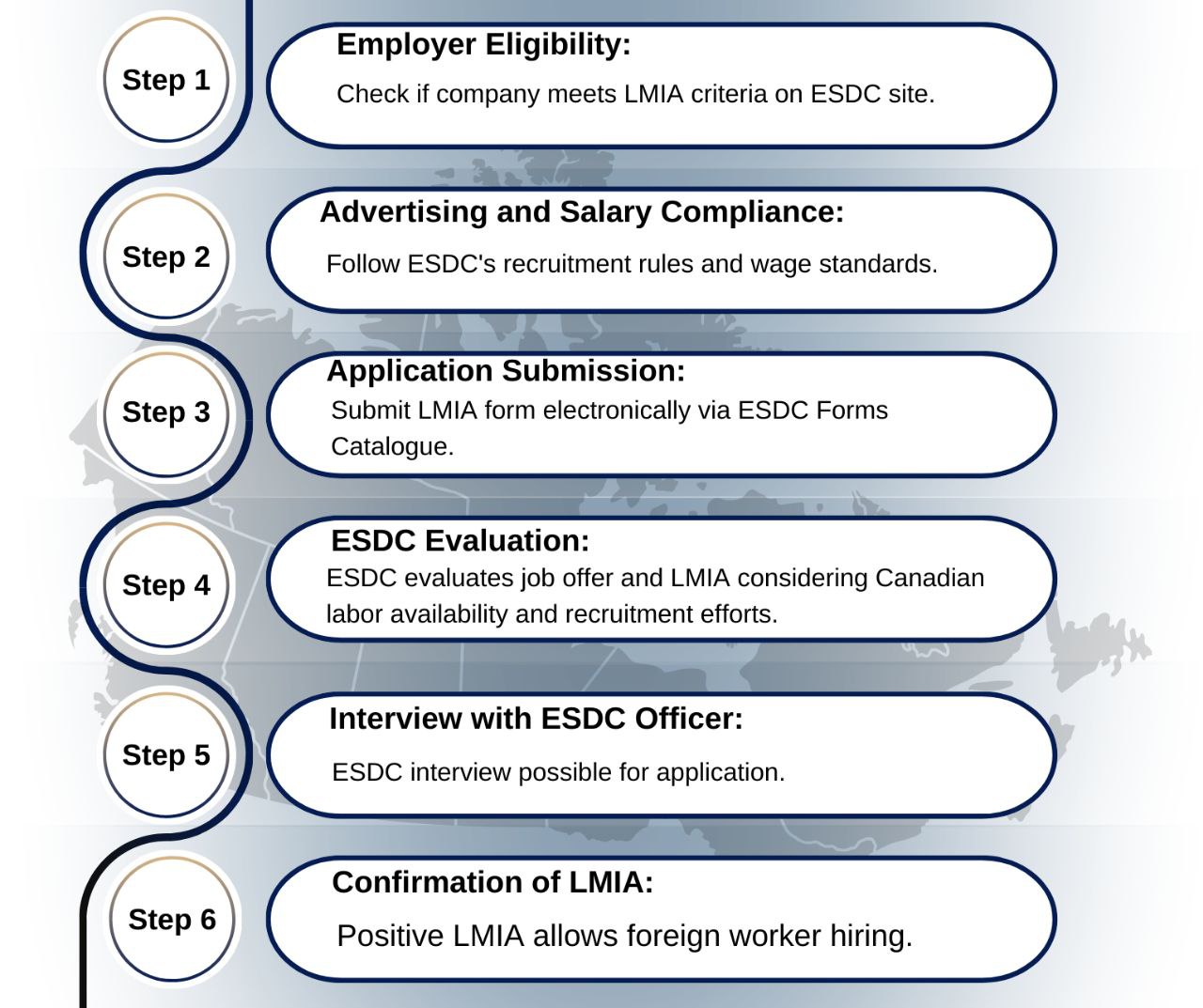
1. Employer Eligibility:
- Determine if your company meets the criteria to apply for an LMIA.
- Specific eligibility requirements and exemptions are available on the Employment and Social Development Canada (ESDC) website.
2. Advertising and Salary Compliance:
- Adhere to ESDC’s advertising and recruitment requirements for the job offer.
- Ensure the offered wage meets prevailing rates in the industry and region for the specific job.
3. Application Submission:
- Submit the completed LMIA application form electronically through the ESDC Forms Catalogue.
- The form and supporting documents can be found online at https://catalogue.servicecanada.gc.ca/content/EForms/en/Catalogue.html.
4. ESDC Evaluation:
- ESDC will assess the job offer and your LMIA application form.
- They will consider factors such as the availability of qualified Canadian workers and your efforts to recruit domestically.
5. Interview with ESDC Officer:
- You may be requested to attend an interview with an ESDC officer to discuss your application further.
6. Confirmation of LMIA:
- Upon receiving a positive LMIA confirmation letter from ESDC, you may proceed with hiring the foreign worker.
Here’s the revised “After LMIA is Approved, What is the Next Step?” section:
LMIA Approval: Next Steps for Foreign Workers
Receiving a positive Labour Market Impact Assessment (LMIA) is a significant step towards securing employment in Canada as a foreign worker. However, it’s important to remember that the LMIA and its Confirmation Letter are not the final steps in the process. To successfully begin working in Canada, you will need to:
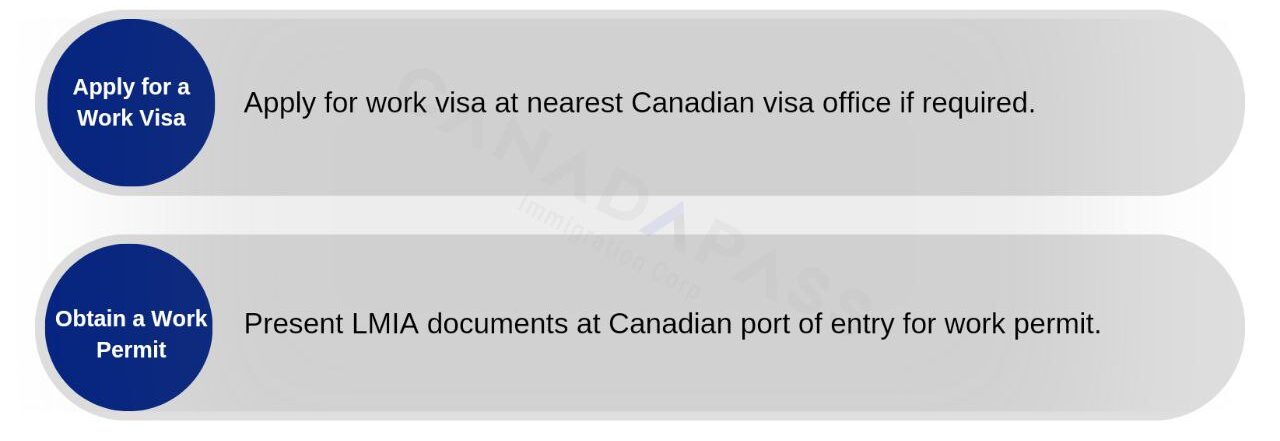
- Apply for a Work Visa (if applicable):
- If you are a citizen of a country requiring a visa to enter Canada, you will need to apply for a work visa at the Canadian visa office serving your region. You can find a list of Canadian visa offices worldwide on the Immigration, Refugees and Citizenship Canada (IRCC) website.
- Obtain a Work Permit:
- Upon arrival at a Canadian port of entry, you must present your approved LMIA Confirmation Letter, job offer letter, signed employment contract, and passport to obtain a work permit. Immigration officials will verify your documents and eligibility before issuing the permit.
Required Documents:
- Job Offer Letter: A formal letter from your Canadian employer outlining the position, starting date, and salary.
- Signed Employment Contract: A legally binding agreement between you and your employer detailing the terms and conditions of your employment.
- LMIA Confirmation Letter: The official document issued by Employment and Social Development Canada (ESDC) confirming a positive LMIA decision.
- LMIA Number: A unique identifier assigned to your LMIA application.
Employer Eligibility and Requirements for LMIA Applications
Canadian employers seeking to hire foreign talent may need to obtain a Labour Market Impact Assessment (LMIA). To be eligible to apply for an LMIA, employers must meet specific requirements:
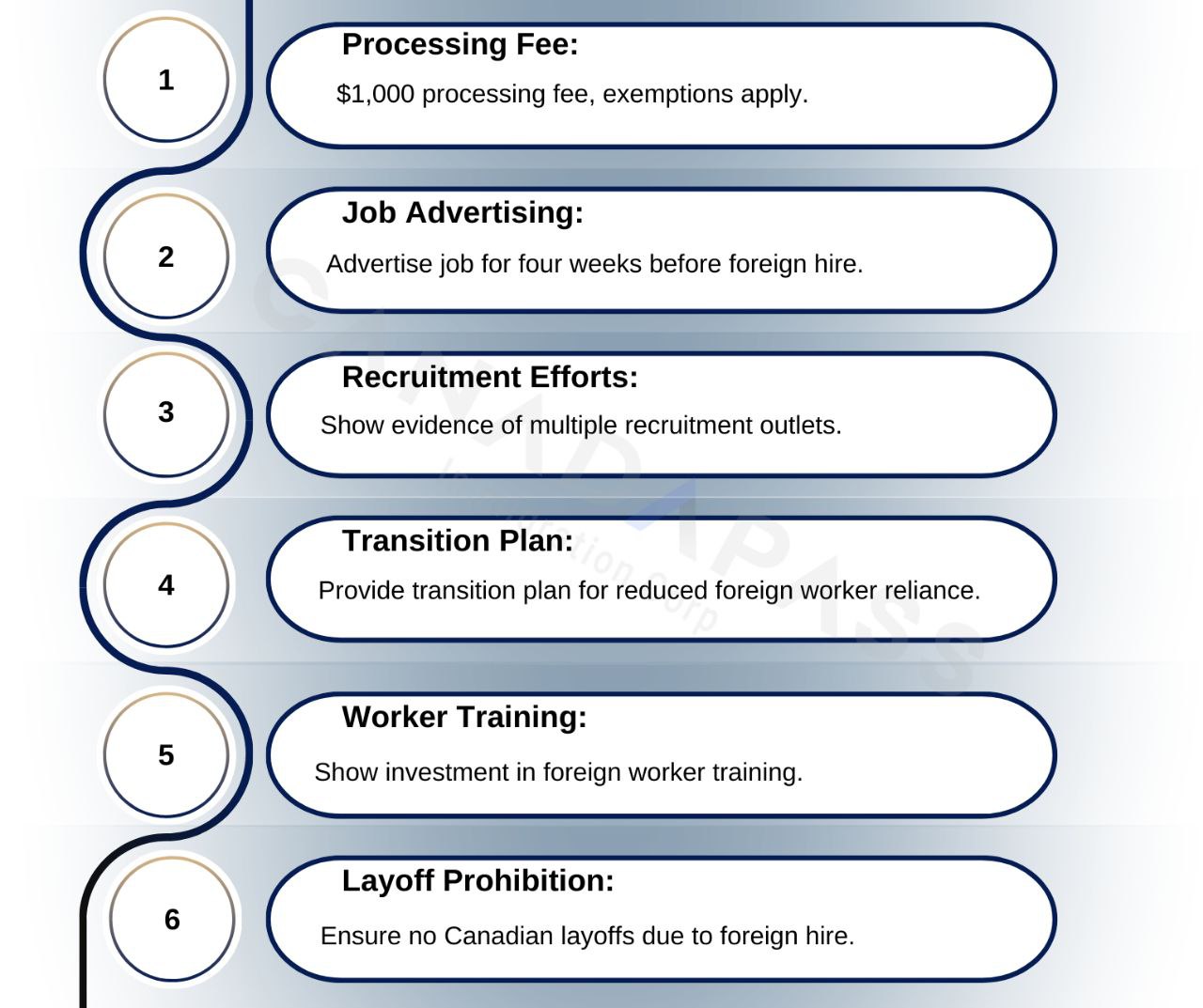
1. Processing Fee:
- Pay a $1,000 CAD processing fee, except for:
- LMIA applications for caregivers employed by low-income families.
- LMIA applications supporting permanent resident applications.
2. Job Advertising:
- Advertise the job position for a minimum of four weeks before offering it to a foreign worker.
3. Recruitment Efforts:
- Provide evidence of using at least two recruitment outlets in addition to the Canadian Job Bank website.
4. Transition Plan:
- Submit a transition plan outlining how the employer will reduce reliance on foreign workers in the future.
5. Worker Training:
- Demonstrate investment in training and development for the foreign worker.
6. Layoff Prohibition:
- Guarantee that no Canadian workers will be laid off due to hiring the foreign worker.
LMIA Work Permit Categories: Understanding Employer Options
The Temporary Foreign Worker Program (TFWP) allows Canadian employers to fill labor shortages by hiring foreign workers under specific conditions. To do so, employers often need to obtain a Labour Market Impact Assessment (LMIA), which comes in multiple categories with different requirements. Here’s an overview of some common LMIA work permit categories:
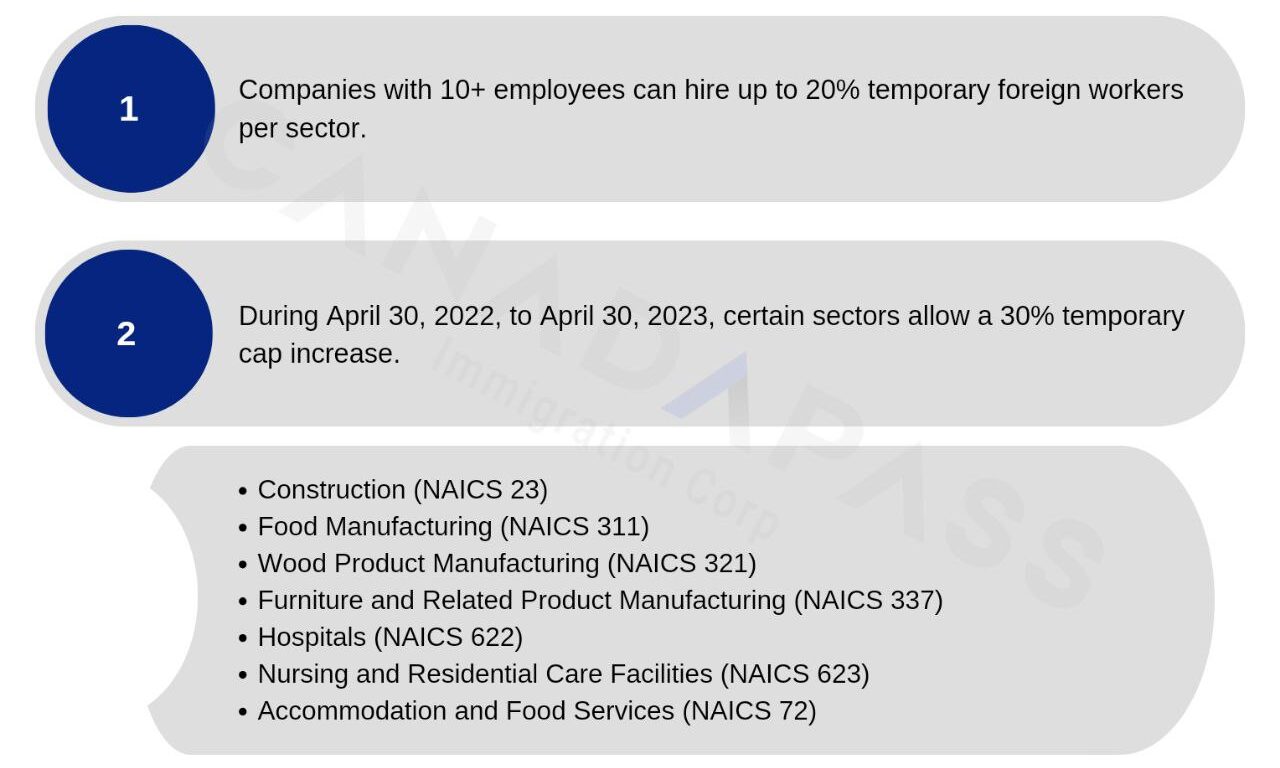
- High-Wage Workers:
- This category covers positions offering salaries exceeding a set threshold ($134,866 CAD in 2024).
- Employers applying for a High-Wage LMIA must submit transition plans demonstrating efforts to reduce reliance on foreign workers, like:
- Investing in skills training for existing employees.
- Hiring Canadian apprentices or graduates.
- Assisting skilled temporary foreign workers in obtaining permanent residency.
- These plans help ensure employers truly need foreign talent and fulfill the TFWP’s purpose of a temporary solution to labor needs.
Median Hourly Wages
Due to recent updates to the Temporary Foreign Worker Program (TFWP), the Canadian government has implemented new median hourly wage thresholds for determining high-wage and low-wage LMIA applications. This table provides an overview of the current median hourly wages by province/territory, effective May 31, 2023.
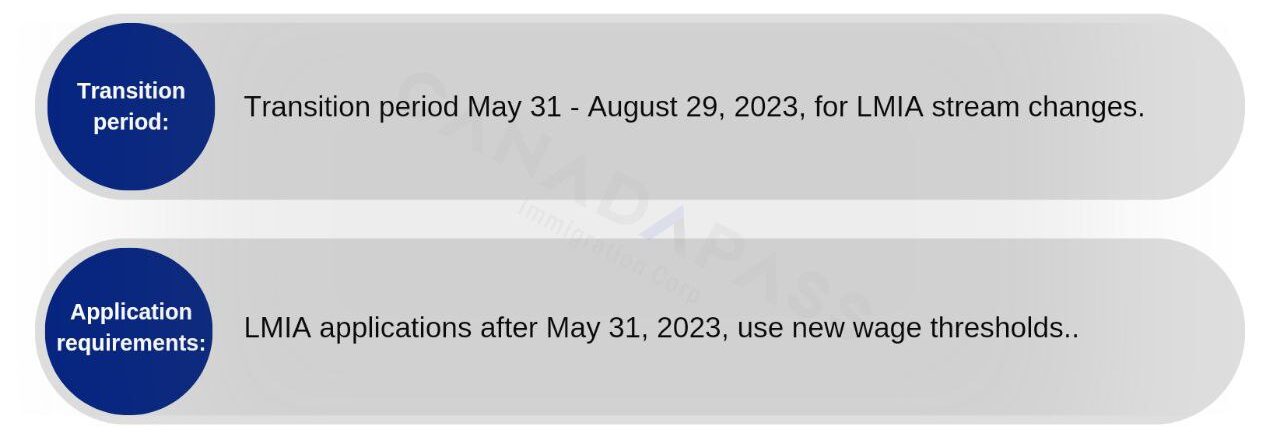
- Transition period: A 90-day transition period was in effect between May 31st and August 29th, 2023. During this period, Service Canada worked with employers whose applications may have switched streams (low-wage to high-wage or vice versa) due to the updated thresholds.
- Application requirements: Employers who submitted their LMIA applications on or after May 31st, 2023, will have their applications assessed using the new median wage thresholds. Applications submitted before May 31st, 2023, will be assessed using the previous thresholds.
| Province/Territory | Median Hourly Wages (Effective May 31, 2023) |
|---|---|
| Alberta | $28.85 |
| British Columbia | $27.50 |
| Manitoba | $23.94 |
| New Brunswick | $23.00 |
| Newfoundland and Labrador | $25.00 |
| Northwest Territories | $38.00 |
| Nova Scotia | $22.97 |
| Nunavut | $35.90 |
| Ontario | $27.00 |
| Prince Edward Island | $22.50 |
| Quebec | $26.00 |
| Saskatchewan | $26.22 |
| Yukon | $35.00 |
Hiring Low-Wage Foreign Workers: Key Considerations
If you plan to hire a foreign worker for a low-wage position, while you are not required to submit a transition plan, your ability to do so is subject to specific limitations set by the Canadian government to manage the number of temporary foreign workers in low-wage roles.
Cap on Low-Wage Foreign Workers:
- For companies with 10 or more employees, the allowable proportion of temporary foreign workers you can hire in any sector is 20%.
- Temporary exception (April 30, 2022 – April 30, 2023): Employers hiring workers in specific sectors and sub-sectors (listed below) are eligible for a higher cap of 30% during this period:
- Construction (NAICS 23)
- Food Manufacturing (NAICS 311)
- Wood Product Manufacturing (NAICS 321)
- Furniture and Related Product Manufacturing (NAICS 337)
- Hospitals (NAICS 622)
- Nursing and Residential Care Facilities (NAICS 623)
- Accommodation and Food Services (NAICS 72)
Employer Responsibilities:
- Employers are responsible for covering transportation costs to Canada at the beginning of the work period and for the worker’s return to their home country upon completion.
- Employers are also responsible for ensuring suitable and affordable housing for their temporary foreign workers.
Assessing LMIA Eligibility: Factors Considered by ESDC
The Employment and Social Development Canada (ESDC) reviews LMIA applications to determine if Canadian employers can hire foreign workers. This assessment considers various factors:
- Labor Shortage:
- Is there a demonstrable labor shortage in the region for the specific position?
- Has the employer exhausted reasonable efforts to recruit qualified Canadian workers?
- Working Conditions:
- Will the offered employment conditions comply with all relevant municipal, provincial, and federal regulations?
- Will the workplace environment be safe and respectful for all employees?
- Wage Fairness:
- Does the offered salary align with the prevailing wage for the position in the region?
- Is the salary fair and competitive compared to similar roles?
- Worker Qualifications and Knowledge Transfer:
- Can the foreign worker effectively perform the job duties and contribute their skills and knowledge to the Canadian workforce?
- Employer Compliance:
- Is the employer currently involved in any ongoing employment disputes?
- Positive Impact on Canadian Jobs:
- Will hiring the foreign worker contribute to job creation or retention in Canada?
LMIA Processing Time: What to Expect in 2024
The Employment and Social Development Canada (ESDC) strives to process LMIA work permit applications efficiently. However, processing times can vary depending on several factors, typically ranging from 10 business days to 2 months.
Factors Affecting Processing Time:
- Application complexity: More complex applications or those requiring additional information may take longer to process.
- Current ESDC workload: The volume of applications received by ESDC can affect processing times.
- Verification and review: ESDC thoroughly verifies information and documentation submitted, which may require additional time.
Recommendations for Employers:
- Submit complete and accurate applications: Ensure all required documents are included and free of errors to avoid delays due to missing information or corrections.
- Consider buffer time: When planning your hiring timeline, factor in a buffer of 1-2 months to account for potential processing variations.
- Seek legal guidance: Consulting with a qualified legal professional can help ensure your application meets all requirements and is optimally prepared.
Remember: Errors or inconsistencies in the application can significantly delay processing and impact the start date for your foreign employee.
Expedited LMIA Processing: Faster Hiring Options
Some employers may be eligible for expedited LMIA processing, receiving a decision within just 10 business days for certain occupations. This can significantly streamline the process of hiring foreign workers. Here are three potential pathways to expedited processing:
- Skilled Trades and High-Demand Professions: Employers hiring foreign workers in specified skilled trades or high-demand professions on the outlined list may qualify for expedited processing if they offer a wage exceeding the provincial median. Eligibility details vary, so consulting the official ESDC website is recommended.
- Top 10% Wage Earners: If your foreign worker’s salary falls within the top 10% of wages earned in your province, you may also be eligible for expedited processing. This option focuses on attracting highly skilled talent through competitive compensation.
- Short-Term Positions: For positions limited to 120 days or less with a salary exceeding the provincial median wage, expedited processing could be available. This pathway caters to specific short-term needs while ensuring fair compensation for temporary workers.
Recruiting and Hiring Foreign Workers: Advertising Requirements and Exemptions
To hire temporary foreign workers, Canadian employers must demonstrate they have attempted to recruit qualified Canadian residents but were unable to find a suitable candidate. This requirement involves:
- Advertising the position for at least four consecutive weeks on the Government of Canada’s Job Bank website (https://www.jobbank.gc.ca/home).
- Using at least two additional recruitment methods appropriate for the position and industry.
- Considering underrepresented groups during recruitment, such as Indigenous persons, vulnerable youth, newcomers, and persons with disabilities.
Exemptions from LMIA Requirement:
The International Mobility Program offers several LMIA exemption categories for Canadian employers:
- Free Trade Agreements (FTAs): Citizens of countries with FTAs with Canada may be exempt from LMIA requirements.
- Global Talent Stream (GTS): Highly skilled international talent recruited through the GTS program benefit from both LMIA exemption and expedited work permit processing.
- CUSMA (ex-NAFTA) Countries: Citizens of the United States or Mexico may be eligible for LMIA exemption under CUSMA provisions.
- CETA Countries: Certain occupations from European Union member states may qualify for LMIA exemption under the Comprehensive Economic and Trade Agreement (CETA).
- Intra-Company Transfer (ICT) Program: Foreign companies with offices in Canada can transfer their employees from overseas to Canada without needing an LMIA through the ICT program.
- Facilitated LMIA for Quebec Employers: This program allows companies in Quebec to bypass the advertising requirement for LMIA applications, potentially speeding up the process.
Approval Rates and Additional Considerations:
While past approval rates for LMIA applications have ranged from 60% to 85%, it’s important to remember that these are estimates and individual applications are assessed based on various factors, including:
- Compliance with advertising and recruitment requirements.
- Competitiveness of the offered salary for the position and region.
- General eligibility of the employer to hire foreign workers.
For expert guidance and maximized approval chances, consider a free consultation with our experienced immigration lawyers at canadapass.com. They can ensure your application meets all requirements and navigate the LMIA process smoothly.
Here’s a revised version of the “LMIA Denial: 3 Top Reasons for LMIA Rejection” section that adheres to informativeness, neutrality, and formality:
LMIA Application Review: Common Reasons for Rejection
The Employment and Social Development Canada (ESDC) carefully reviews LMIA applications to ensure compliance with Canadian immigration and labour regulations. While each application is assessed individually, some factors frequently contribute to denials. Here are three common reasons:
- Insufficient Demonstration of Canadian Labour Shortage:
- ESDC requires employers to demonstrate that they have made genuine efforts to recruit qualified Canadian residents for the position before seeking a foreign worker.
- This includes advertising the position through various channels and considering candidates from underrepresented groups.
- Insufficient evidence of recruitment efforts or offering a salary below market rates can raise concerns about a genuine labour shortage.
- Non-Compliance with Canadian Labour Standards:
- Employers applying for LMIAs must have a history of compliance with Canadian labour laws and regulations, including fair wages, safe working conditions, and respect for employee rights.
- A history of violations or unresolved complaints can raise concerns about the employer’s commitment to maintaining these standards for foreign workers.
- Misrepresentation of Information in the Application:
- Providing inaccurate or misleading information in an LMIA application can lead to rejection. This includes exaggerating qualifications, misrepresenting salary offers, or fabricating recruitment efforts.
- All information submitted must be truthful and verifiable to ensure the integrity of the LMIA process.
Additional Considerations:
- These are just some of the common reasons for LMIA denials. Other factors, such as the type of work, the foreign worker’s qualifications, and the employer’s overall immigration history, can also influence the decision.
- For detailed information and guidance on LMIA requirements and potential exemptions, please visit the official ESDC website: https://www.canada.ca/en/employment-social-development/programs/temporary-foreign-worker.html.










